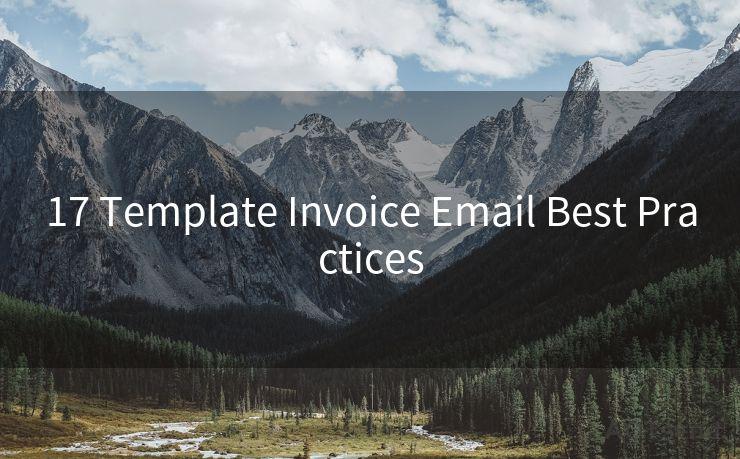17 Template Invoice Email Best Practices




When it comes to invoicing, efficiency and clarity are paramount. An invoice email is not just a formal request for payment; it's also a reflection of your professionalism and brand. Here are 17 best practices to help you create the perfect invoice email template for your business.
1. Clear Subject Line
Start with a clear and concise subject line that immediately identifies the email as an invoice. For example, "Invoice #1234 for Project XYZ".
2. Professional Greeting
Open with a professional greeting, addressing the recipient by name if possible. This personal touch adds a level of warmth and familiarity to an otherwise formal email.
3. Invoice Details
Provide all the necessary invoice details, including the invoice number, date, and the total amount due. Make sure these details are prominent and easy to find.
4. Itemized Services or Products
Include an itemized list of services rendered or products sold, along with their respective prices. This transparency builds trust and reduces confusion.
5. Payment Terms and Conditions
Clearly state the payment terms, including the due date, any late fees, and accepted payment methods. Provide links or instructions for online payments if applicable.
6. Contact Information
Include your contact information in case there are any questions or issues with the invoice. This could be an email address, phone number, or even a link to your customer service page.
7. Thank You Note
A simple "thank you" goes a long way in fostering good customer relations. Express gratitude for the business and look forward to future collaborations.
8. Branding and Design
Maintain consistency with your brand identity by using your company's logo, colors, and font styles in the email template. This enhances professionalism and recognition.
9. Avoid Unnecessary Text
Keep the email concise and to the point. Avoid adding unnecessary fluff or marketing material that might distract from the main purpose of the invoice.
10. Attach PDF Invoice
Always attach a PDF version of the invoice for easy printing and archiving. Some clients might prefer a hard copy for their records.
11. Mobile-Friendly Design
Ensure that your email template is mobile-friendly, as many clients will be checking their emails on the go.
12. Call to Action
Include a clear call to action, such as "Please process this invoice by the due date." This provides a sense of urgency and directs the recipient to the next step.
13. Follow-Up Plan
Have a plan to follow up on unpaid invoices. This could be a friendly reminder email a few days before the due date or a more formal notice for overdue invoices.
14. Testimonials or Reviews
If appropriate, include positive testimonials or reviews from satisfied clients. This can add credibility to your invoice and encourage timely payment.
🔔🔔🔔
【AOTsend Email API】:AOTsend is a Managed Email Service for sending transactional emails. Support Email Types: reminders, authentication, confirmations, notifications, verification codes, invoices, password resets, account activations, billing statements, two-factor authentication (2FA), and one-time passwords (OTP) emails, etc. $0.28 per 1000 Emails. 99% Delivery, 98% Inbox Rate.
You might be interested in:
Why did we start the AOTsend project, Brand Story?
What is a Managed Email API, How it Works?
Best 25+ Email Marketing Platforms (Authority,Keywords&Traffic Comparison)
Best 24+ Email Marketing Service (Price, Pros&Cons Comparison)
Email APIs vs SMTP: How they Works, Any Difference?
15. Legal Compliance
Ensure that your invoice email template complies with all relevant legal requirements, such as tax regulations and consumer protection laws.
16. Provide Options for Queries or Disputes
Offer a clear path for clients to raise queries or disputes regarding the invoice. This could be a dedicated email address or a customer service hotline.
17. Regular Updates and Reviews
Periodically review and update your invoice email template to reflect any changes in your business practices, branding, or legal requirements.

By following these best practices, you can create an invoice email template that is not only professional and efficient but also reflects positively on your brand. Remember, an invoice is often the last point of contact with a client before payment, so make sure it leaves a good impression.
Incorporating these 17 best practices into your invoice email template will ensure that your invoicing process is smooth, efficient, and professional. By providing clarity, transparency, and a sense of urgency, you can increase the likelihood of timely payments and maintain positive relationships with your clients.




Scan the QR code to access on your mobile device.
Copyright notice: This article is published by AotSend. Reproduction requires attribution.
Article Link:https://www.mailwot.com/p4634.html



